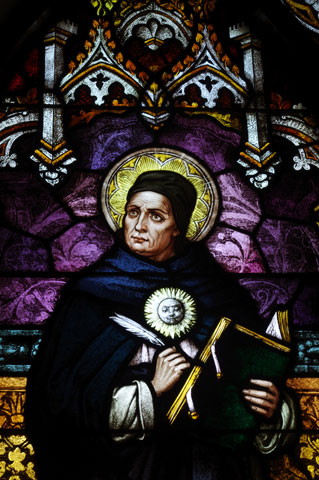
St. Thomas Aquinas is depicted in a window at St. Joseph Catholic Church in Central City, Ky. (Wikimedia Commons/Nheyob)
 POLITICS FOR A PILGRIM CHURCH: A THOMISTIC THEORY OF CIVIC VIRTUE
POLITICS FOR A PILGRIM CHURCH: A THOMISTIC THEORY OF CIVIC VIRTUE
By Thomas J. Bushlack
Published by Wm. B. Eerdmans Publishing Co., $35
Alasdair MacIntyre and Charles Taylor are two renowned Catholic philosophers not likely to agree about much beyond the Nicene Creed. But once, in 2005, I heard them agree about St. Thomas Aquinas.
Both appreciated Aquinas' writings and his ongoing contribution to the church. Yet both lamented what Aquinas' remarkable work had unleashed: "The analytical codification of everything," as MacIntyre put it, the transformation of faith into a rigid system that encompasses all of reality.
Aquinas' followers simply went too far, they said, transforming his philosophical system into something Aquinas never intended.
Perhaps if I had not heard MacIntyre and Taylor, it might seem stranger to say that the Second Vatican Council poses us with a new springtime for Aquinas. But Thomas J. Bushlack indeed approaches Aquinas in this way, in line with MacIntyre and Taylor and, as his book Politics for a Pilgrim Church demonstrates, with the deepest intellectual roots of Vatican II.
Bushlack is assistant professor of Christian ethics in the department of theology at the University of St. Thomas in St. Paul, Minn., and his book reflects the breadth of his appointment. Politics for a Pilgrim Church is not a narrowly focused work of theology. Instead, Bushlack engages literature from politics, philosophy and history, an approach that, joined to theology, presents a comprehensive examination of a difficult, interdisciplinary topic.
The book begins, as some of the finest theological minds at Vatican II began, with Aquinas himself. Bushlack agrees with Yves Congar and Marie-Dominique Chenu, that "Aquinas's significance can only be appreciated when his work is read not as rigidly imposed dogmatic conclusions, but rather within the context of the thirteenth-century renaissance of scholastic thought and Christian humanism."
We turn to Aquinas not as a guide to help us freeze Catholicism in a 13th-century cast of amber, but rather for a method with which to approach problems that do not change in a world that changes constantly.
The common good is "a way of living together within a particular society or culture, that somehow reflects that which the members of the body politic uphold together as the most important values and goods."
But the common good has suffered between the disintegrating sense of shared purpose outside the church and the rhetoric used by Catholics to wage a culture war.
We Catholics have done our part to frustrate a truly "common" good that could include everyone when we have insisted that we have the only right answers to political problems. Bushlack proposes that the job of the church is to express a civic virtue that presents a picture of the common good that is accessible and intelligible to our non-Christian neighbors.
Bushlack describes a civic virtue that is perhaps even more about the church than it is about the state. Politics for a Pilgrim Church comes as a challenge to be the church differently in the public square. Rather than dictating answers to public policy problems from the catechism, this means offering Christian witness through dialogue in political and social life.
The church is a pilgrim church on a journey in the world. We can (and should) adopt different rhetorical strategies adapted to different audiences. We should not speak in politics as though everyone is a believer.
Our mission in Christian life is to bring forth the kingdom, to invite the world to salvation. But politics is distinct from evangelization and oriented to practical goods in the world. This is the common good toward which civic virtue rooted in engagement and dialogue aims.
Philadelphia Archbishop Charles Chaput argued in a 2008 book that, in political debate, Catholics too often defer to our secular neighbors "out of a misguided sense of good manners." We do not present the faith forcefully enough, he argued.
This is the false dilemma that Bushlack's book exposes. We are a pilgrim church. We are not at home in this world (Philippians 3:20), and only the rudest visitor speaks in someone else's home with the same freedom he speaks in his own.
As pilgrims, our choice is not between harsh honesty and being false witnesses to our faith. We can be good guests and still be faithful. We can speak truthfully in ways that do not wear out our welcome.
This is the virtue associated with political life we find in Aquinas, one that Bushlack has developed in line with Vatican II, with Pope John XXIII, with Congar, and Chenu.
In the too fraught climate of church and state, Bushlack's work is a welcome contribution that calls us to calm down and be more thoughtful in a way consistent with what is best in the church's tradition.
[Steven P. Millies is associate professor of political science at the University of South Carolina Aiken.]



